About the Programme (Graduate Diploma in Social Work)
Overview
The GDSW programme was launched in 1999 and is for persons holding non-social work degrees. They are typically currently working in social service sector or planning to switch into social work.
Objectives
To train non-social work graduates to be competent social service professionals by providing professional knowledge and skills in:
- Social work theory and practice;
- Social service delivery systems.
Click here to watch the full video to hear from our alumni (Ms Nurul Khairiah, Mr Ng Yong Hao, Mr Sean Cheng) about our Graduate Diploma in Social Work programme.
Duration
The candidature period is as follows:
| Coursework Programme | Normal Candidature | Maximum Candidature | ||
| Full-Time Study (in years) | Part-Time Study (in years) | Full-Time Study (in years) | Part-Time Study (in years) | |
| Graduate Diploma in Social Work | 1 | 1.5 | 2 | 3 |
Students who exceeded their normal candidature will have to pay full, non-subsidised fees, during their extended semesters.
Programme Structure
For Students Admitted from AY 2024/25 onwards
A candidate for the Graduate Diploma in Social Work must offer not fewer than six courses and a social work practicum.
The Graduate Diploma in Social Work programme comprises the following components:
- 5 Core courses*
- 1 Elective course
- 1 Social Work Practicum
*Candidates possessing a recognised social work academic qualification may be exempted from one or more essential courses if they had already done similar courses in their undergraduate degree. The exempted core course(s) will be replaced with elective course(s) as approved by the Head of Department of Social Work.
- SWD5102 Social Work with Groups and Community
- SWD5103 Contemporary Social Work Practice
- SWD5104 Human Development in Context
- SWD5105 Skills in Social Work Practice
- SWD5106 Social Service Planning in Policy Context
- SWD5272 Multidisciplinary Perspectives on Ageing
- SWD5263 Family-Centred Practice
- SWD5269 Working with Children and Youth
- SWD5277 Planned Social Change
- SWD5297 Human Service Organisations & Management
- SWD5285 Rehabilitation Programme Issues
- SWD5880E Social Work Practice in Mental Health
- SWD5880D Social Work in Healthcare Settings
- SWD5880 Topics in Social Work
Note: Not all elective courses are necessarily available in any one year.
- SWD5120 Social Work Practicum
Candidates are required to attend a six-hour pre-placement workshop, and fulfil 400 fieldwork hours which include field seminars and placement in a social service agency under an approved supervisor. The fieldwork hours are to be undertaken in an agency outside the candidate's work place. The candidate is only allowed to take the Social Work Practicum if he/she have completed and passed the pre-requisite courses: SWD5103 and SWD5105.
Click here for the Practicum Manual and Forms (NUS login required)
Testimonials for Graduate Diploma in Social Work
| Name: | Ms Sia Seow Hong |
| Programme: | Graduate Diploma in Social Work |
| Year: | From 2003 to 2004 |
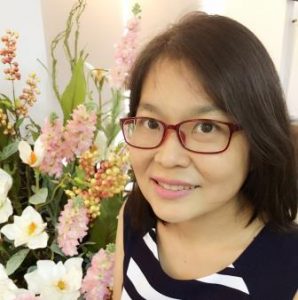
Certain about making the switch from a career in engineering to social services, Ms Sia Seow Hong signed up for the Graduate Diploma in Social Work programme at the National University of Singapore. It offered a good blend of subjects that would equip her to engage with people of different ages. It also gave her the knowledge and practice opportunities needed for work.
After volunteering for 10 years in various organisations, Ms Sia Seow Hong was certain about making the switch from a career in engineering to social services. She joined TRANS Family Service Centre (FSC) as a Programme Executive in 2002, and applied for the Graduate Diploma in Social Work (GDSW) programme at the National University of Singapore (NUS) within three months, embarking on a fulfilling two-year journey to become a full-fledged Social Worker.
“The course offered a good blend of subjects to equip us to work with people of different ages. Learning about the stages in Case Work Management gave me confidence to work with clients. Being able to refer to each stage by name also helped in the case discussions with colleagues. Lessons were dynamic and interactive. We honed our skills through role-play. Discussions were interesting. Case studies helped us understand client issues,” said Seow Hong.
Several courses were particularly memorable. Engaging conversations took place in Dr K Mehta’s classes on working with the elderly. Concepts of Community Work were fleshed out by Dr S Vasoo’s examples of grassroots initiatives. “I was introduced to Family Therapy through an elective course. It provided me with a framework to work with families,” she added.
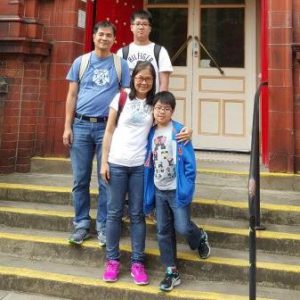
Seow Hong’s cohort was tight-knit. Students came from different backgrounds, but they were all eager to learn and be trained as Social Workers. Lecturers were approachable and nurturing –they led the way in building a community that encouraged personal and professional development. During her practicum, Seow Hong met up regularly with fellow students for field practice seminars at the NUS Department of Social Work. She grew in self-awareness through sharing in the group about her fieldwork experiences.
Not only did the GDSW programme equip Seow Hong with the knowledge and practice opportunities that she needed to perform at work, it prepared her for the roles she eventually took on. After moving on to work at Montfort Care, she helped to run Good Life! –a programme that reached out to seniors living alone to ensure that they were provided with the necessary assistance and support to age-in-place. She is now Lead Social Worker in @27 –Montfort Care’s second FSC.
Seow Hong did the programme on a part-time basis, completing it in 18 months, while managing a case- and programme load at TRANS FSC. Juggling work, lessons, and family was no easy task, especially with a five-year-old son. But, with an understanding employer and a supportive spouse, Seow Hong’s single-mindedness to be professionally trained as a Social Worker saw her through. “My boss allowed me to leave the office early three times a week and my husband drove me home after class. My son came too!”
“The training was rigorous but rewarding. And, it was worth it.”
| Name: | Mr Ng Yong Hao |
| Programme: | Graduate Diploma in Social Work |
| Year: | From 2015 to 2016 |
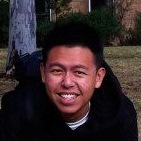 Quality teaching was Mr Ng Yong Hao’s main driving force to apply for the Graduate Diploma in Social Work programme at the National University of Singapore, for it takes skill to work with those who are suffering, marginalised, and disenfranchised. He learnt tremendously from his lecturers and Field Supervisor, who share a depth of experience in Social Work practice.
Quality teaching was Mr Ng Yong Hao’s main driving force to apply for the Graduate Diploma in Social Work programme at the National University of Singapore, for it takes skill to work with those who are suffering, marginalised, and disenfranchised. He learnt tremendously from his lecturers and Field Supervisor, who share a depth of experience in Social Work practice.
Yearning to further develop his skills and knowledge in working with people, Mr Ng Yong Hao applied to be a part-time student at the National University of Singapore (NUS) Graduate Diploma in Social Work (GDSW) programme. A researcher and programme administrator at the NUS Chua Thian Poh Community Leadership Programme (CTPCLP), his job involved studying the landscape of youth organisations in Singapore, as well as mentoring undergraduates in their community and research projects.
“It showed me the importance of front line work. Watching the undergraduates collaborate and work with marginalised clients, inspired me to jump in! In addition, I realised that people are influenced by familial, communal, and societal factors. Therefore, I hoped to learn about systemic interventions from the Social Work field,” said Yong Hao, who is also a professional coach certified by the International Coach Federation.
Quality teaching was Yong Hao’s main driving force to apply for the GDSW programme at his alma mater. “While pursuing my Bachelor of Science degree, I had taken some electives offered by the Department of Social Work. As such, I knew I would be able to learn from faculty members who had a depth of experience.” With the longest history of conducting Social Work research in Singapore and a strong capacity in that arena, it was also the best place for Yong Hao to further explore his interest in research.
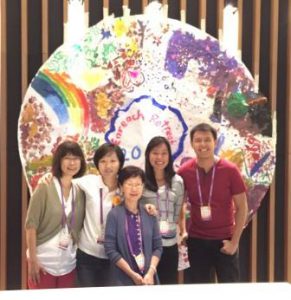
The GDSW programme helped Yong Hao clarify his assumptions and beliefs. “I developed a greater awareness of the values that I possessed. This was a critical and essential endeavour because values will heavily inform our interactions with clients, who may be marginalised, disenfranchised, and hold beliefs that are radically different from ours.”
Through his practicum at the National Cancer Centre Singapore (NCCS), Yong Hao came to see the importance of journeying with cancer patients and their caregivers. Upon completing the GDSW programme, he joined NCCS as a Medical Social Worker cum Programme Executive.
“My practicum and field practice seminars at NUS provided a platform to consolidate and apply what I had learnt. As an intern, it was a space to reflect on my practice. My Field Supervisor from NCCS imparted a tremendous amount of skills and knowledge. Interacting with him was invaluable to my development,” he said.
In Social Work practice, the use of Self refers to the combining of knowledge, values and skills gained in Social Work education with aspects of one’s personal self, including personality traits, belief systems, life experiences, and cultural heritage. (Dewane (2006) cited by Walters (2008)) “The use of Self is an often underplayed fundamental in the profession. An excellent supervisor is able to help a Social Worker to work on Self. This is key to becoming a skilful Social Worker,” he added.
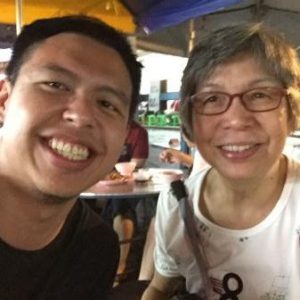 Yong Hao grew immensely through the 18-month GDSW programme. “It was a short, but intensive programme to become a full-fledged Social Worker. One valuable takeaway was resilience. Balancing family, work and part-time studies, was tough. But, the experience showed me that it is possible!”
Yong Hao grew immensely through the 18-month GDSW programme. “It was a short, but intensive programme to become a full-fledged Social Worker. One valuable takeaway was resilience. Balancing family, work and part-time studies, was tough. But, the experience showed me that it is possible!”
Reference:
Walters, H. B. (2008). An Introduction to Use of Self in Field Placement. The New Social Worker.
| Name: | Ms Lim En Yin, Amanda |
| Programme: | Graduate Diploma in Social Work |
| Year: | From 2016 to 2017 |
Ms Lim En Yin, Amanda’s passion in the social service sector started 8 years ago, where she had to work with youth-at-risk, families in need of financial assistance, and other interprofessional issues. As a young entrant in the field then and having to manage clients with a wide array of presenting problems, Ms Lim En Yin, Amanda realised the importance of grounding her work with social work knowledge. “Admittedly when I first started, I had relied a lot on my gut feelings to guide me in my interaction with clients”, Ms Lim En Yin, Amanda explained. It was this sense of inadequacy that spurred her to pursue a Graduate Diploma in Social Work (GDSW) at the National University of Singapore.
Amanda grew immensely through the GDSW programme, which included a wide array of learning pedagogies such as lectures, a 400-hour field practicum, and a practicum seminar. For Amanda, these different pedagogies served to enrich her learning experience and is invaluable to hone the competencies required of a Social Worker.
“The modules had developed professional capabilities by equipping me with not just knowledge on theoretical frameworks and concepts, but also on essential skills in communicating with clients”, said the Senior Youth Guidance Officer at the Ministry of Social and Family Development. She further added that her field practicum at the Big Love CPSC has provided her an opportunity to “utilize the knowledge and skills learnt through the course”, in a “safe and guided setting”. During the practicum, she is grateful that her supervisor had constantly challenge her to reflect on her practice by grounding it on theoretical frameworks and concepts. To further support her practicum learning, Amanda also had to attend the practicum seminar, which she felt was a good platform for her to share her “takeaways and reflections from the practicum experience”.
One major challenge that Amanda faced during her current work at the residential care setting is to strike a balance between catering to the individual needs of the youth and ensuring fairness in discipline. Through her practicum, Amanda gained insight on the importance of rapport building with her youths, which has helped her to be more effective in working with them, moving forward.
Besides her professional growth, the GDSW has also helped Amanda to develop at a personal level. She shared that she is now more mindful of her interaction with her loved ones and has developed a sense of empathy towards people around her.
Reflecting on her GDSW journey, Amanda fondly recalls how the support from her peers and the many friendships forged, have helped her to cope with the challenges of having to juggle between her work, family commitments and her part time study. For her, these challenges grew dim, in light of her goal as a Social Worker, which is to make a difference in the lives of others.
| Name: | Ms Ranitha Govindasamy |
| Programme: | Graduate Diploma in Social Work |
| Year: | From 2016 to 2017 |
Armed with a Bachelor in Sociology, Ms Ranitha Govindasamy, who enjoyed learning, thought that she was finally done with the classroom as she was eager to put her knowledge and skills to use at the working world. Yet, after starting work at the Social Service Sector, she soon began to miss the excitement of learning. Thus, Ms Ranitha Govindasamy enrolled in the Graduate Diploma in Social Work (GDSW) programme in 2016. According to her, the GDSW programme is the best of both worlds as it offered her the opportunity to marry learning with practice.
A medical social worker at the National Cancer Centre Singapore, Ranitha shared that the programme has helped her to ground her daily work with social work theories. She has also observed a marked improvement in her skills set, which has helped her to deliver her services to her clients more effectively.
She particularly recalled that she had learnt about the cycle of violence during one of the modules in class. This new knowledge soon served to be empowering for her when she had to work with a victim of domestic violence. She felt that she was better equipped to work with the client and was able to understand the situation of the client, through a theoretical lens. For Ranitha, the content taught in the GDSW programme had a lot of practice relevance at her workplace.
The interplay between learning and practice is very much evident for Ranitha, who engages in reflective practice at her workplace. With the critical thinking skills honed during the programme, Ranitha shared that she would now often reflect upon her communication with her clients or whether there are areas of improvement in her work with clients, in order to better serve her clients.
One feature about the GDSW programme which stood out for Ranitha, was the dynamism in the classes she had attended. As her classmates were mostly part time students who are working at the various settings within the Social Service Sector, Ranitha felt that this diversity was a learning platform for her to find out about the various roles of Social Workers at the different settings. Hence, besides learning about the profession from her lecturers, this element of peer learning was refreshing and meaningful for her. She also shared that the 400-hour field practicum in which she had to practice at an organisation other than her workplace, has helped to broaden her perspectives about the profession and the field.
Reflecting on her time in the GDSW programme, Ranitha was heartened that the support from her peers has helped her to cope with some challenging times. She is confident that this peer support will continue as they embark on their adventure as social workers.
In all, the GDSW programme was enriching for Ranitha and she appreciates the NUS Department of Social Work as well as the lecturers for being a part of her Social Work journey.
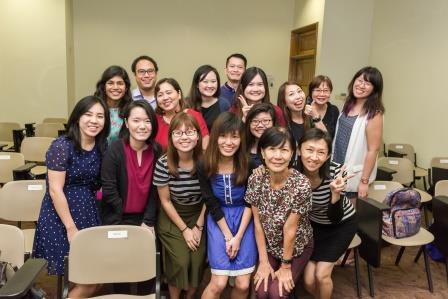
| Name: | Mr Kok Weng Chew |
| Programme: | Graduate Diploma in Social Work |
| Year: | From 2016 to 2018 |
Please click here for the testimonial.

